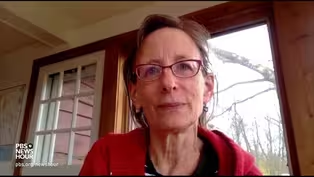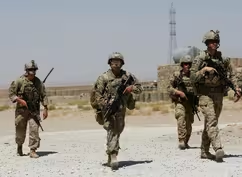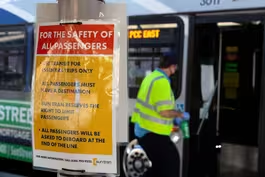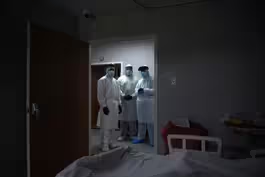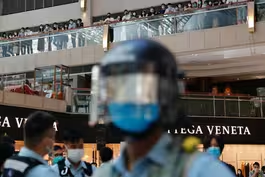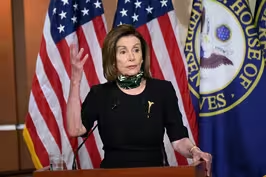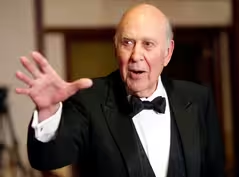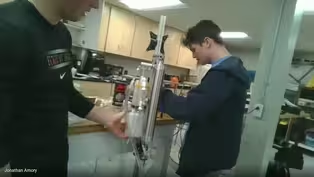
June 30, 2020 - PBS NewsHour full episode
6/30/2020 | 57m 46sVideo has Closed Captions
June 30, 2020 - PBS NewsHour full episode
June 30, 2020 - PBS NewsHour full episode
Problems playing video? | Closed Captioning Feedback
Problems playing video? | Closed Captioning Feedback
Major corporate funding for the PBS News Hour is provided by BDO, BNSF, Consumer Cellular, American Cruise Lines, and Raymond James. Funding for the PBS NewsHour Weekend is provided by...

June 30, 2020 - PBS NewsHour full episode
6/30/2020 | 57m 46sVideo has Closed Captions
June 30, 2020 - PBS NewsHour full episode
Problems playing video? | Closed Captioning Feedback
How to Watch PBS News Hour
PBS News Hour is available to stream on pbs.org and the free PBS App, available on iPhone, Apple TV, Android TV, Android smartphones, Amazon Fire TV, Amazon Fire Tablet, Roku, Samsung Smart TV, and Vizio.
Providing Support for PBS.org
Learn Moreabout PBS online sponsorshipJUDY WOODRUFF: Good evening.
I'm Judy Woodruff.
On the "NewsHour" tonight: coronavirus closures.
Nationwide, spikes in COVID infections and inconsistent health advisories force states to reimpose social distancing measures.
Then: one-on-one.
House Speaker Nancy Pelosi on the ongoing pandemic response, the reports of Russia offering money to Taliban fighters to kill U.S. troops, and more.
Plus: meeting the moment.
Inventors and innovators search for new ways to make ventilators to help the increasing number of coronavirus patients.
DR. RICHARD BOYER, Co-Founder, CoVent-19 Challenge: I used to be a medical device designer, and I use ventilators every day.
So, when I started learning about the ventilator shortages, it became very natural to me to want to work on the engineering side of this issue.
JUDY WOODRUFF: All that and more on tonight's "PBS NewsHour."
(BREAK) The U.S. is now averaging roughly 40,000 new confirmed COVID-19 infections each day.
The caseload has more than doubled this month in at least 10 states, mostly in the South and the West.
Today, the nation's top health experts sounded new warnings about the recent surge and spoke to the prospect of developing a vaccine.
William Brangham begins our coverage.
WILLIAM BRANGHAM: With multiple states seeing new spikes in coronavirus cases, the Senate heard caution today from the nation's top infectious disease expert.
DR. ANTHONY FAUCI, NIAID Director: I would not be surprised if we go up to 100,000 a day if this does not turn around, and so I am very concerned.
WILLIAM BRANGHAM: Dr. Anthony Fauci testified at a hearing, alongside other members of the federal COVID-19 response team.
Fauci did say he was hopeful about a vaccine coming by this winter, at the earliest.
DR. ANTHONY FAUCI: There is no guarantee -- and anyone who has been involved in vaccinology will tell you -- that we will have a safe and effective vaccine, but we are cautiously optimistic.
WILLIAM BRANGHAM: Dr. Robert Redfield, director of the Centers for Disease Control and Prevention, called this virus the greatest public health challenge in a century.
DR. ROBERT REDFIELD, CDC Director: Daily cases are increasing, after an extended decline.
We're seeing significant increases in the Southeast and Southwest regions of this nation.
WILLIAM BRANGHAM: All the witnesses today stressed the importance of the few tools we do have: social distancing, handwashing, and wearing masks.
And now a growing number of conservative voices, many who had resisted masks before, are coming out in support of them.
Republican Committee Chair Lamar Alexander of Tennessee had a message for President Trump, who's been particularly resistant to wearing them.
SEN. LAMAR ALEXANDER (R-TN): I have suggested that the president occasionally wear a mask, even though, in most cases, it's not necessary for him to do so.
The stakes are too high for this political debate about pro-Trump, anti-Trump masks to continue.
WILLIAM BRANGHAM: Today's hearing comes as the Trump administration continues to paint a rosier picture of the pandemic than public health officials.
Vice President Mike Pence, head of the Coronavirus Task Force, spoke this afternoon.
MIKE PENCE, Vice President of the United States: We're in a much better place today, thanks to the whole-of-government approach, the whole-of-America approach, that President Trump initiated at the very outset of the coronavirus pandemic.
WILLIAM BRANGHAM: Earlier, former Vice President and presumptive Democratic presidential nominee Joe Biden excoriated the administration for its handling of the pandemic.
JOSEPH BIDEN (D), Presidential Candidate: It didn't have to be this way.
Month after month, as other leaders in other countries took the necessary steps to get the virus under control, Donald Trump failed us.
WILLIAM BRANGHAM: As the virus spreads in a number of states, some officials have had to dial back their reopenings.
On Monday, Texas and California both reported record increases in new infections.
Cases in Florida are also soaring.
In Arizona, hospitalizations have nearly doubled in the last two weeks, prompting Governor Doug Ducey to scale back his state's reopening.
Meanwhile, the 31-nation European Union announced today it will open its borders to 14 other countries.
The United States, because of its outbreak, is not on that list.
For the "PBS NewsHour," I'm William Brangham.
JUDY WOODRUFF: With more than half of the country grappling with this summer COVID surge, eyes are on Congress, with calls for a new economic relief package.
We turn now to speaker of the House, Nancy Pelosi.
She represents California, one of the states hit hardest and earliest by COVID-19.
Madam Speaker, thank you very much for joining us.
We appreciate it.
As we have been hearing, there is this new surge, alarming reports on the comeback of this pandemic and, at the same time, people looking to the Congress for economic relief.
But, right now, Democrats and Republicans seem to be in your separate corners.
You said over the weekend you think Republicans are going to come around.
What are Democrats prepared to do?
REP. NANCY PELOSI (D-CA): What we were prepared to do is pass the HEROES Act, which we did, and everything that is in there, almost 99 percent of it, is what Republicans have voted for before.
But as you go through these statistics about COVID, understand this.
In the HEROES Act, we have an answer.
We can open up our economy by testing, testing, testing.
They're talking about masks.
I agree.
Washing your hands, I agree.
Keeping your distance, I agree.
But testing, tracing, treating, and distancing are the tools that we have at our disposal now.
This administration has been a terrible failure.
I don't like to dwell on them.
I want to go forward.
But for them to call -- come out there and say their plan from the start has put us in a good place, over 125,000 people died from this.
Because the president called it a hoax, delayed, denied, death pursued.
We have in the bill the testing that is the answer.
We -- all of the scientists tell us, the academics tell us, you must test many more people every day, test, trace, and then treat, so that we can stop the deaths, which are disproportionately hurting our communities of color as well.
So, in that bill is an answer.
It's a strategic plan, that -- they haven't thought strategically.
Our first bill on March 4 on the COVID issue was for testing, testing, testing.
Our recent bill -- the most recent bill that passed was about helping small business and testing.
And they still haven't embraced a strategic way to go about it.
Instead, they are just - - I mean, I feel so sad for the vice president for what he is being forced to say.
JUDY WOODRUFF: But for most -- but for legislation to be passed, of course, Madam Speaker, both parties have to be on board.
The Republicans have said -- you have said the Republicans need to give some.
My question is, are the Democrats?
We heard the Senate majority leader, Mitch McConnell, say today that this unemployment benefit, $600 a week above the normal unemployment benefit, he said it's too much, it is allowing -- it's paying people to stay home from work.
Is that an example of something that you think Democrats are prepared to give on?
REP. NANCY PELOSI: Forgive me for not appreciating giving so much time to Mitch McConnell's objections to $600 to people who are out of work.
We will have that negotiation.
But, in this bill, in the first pillar of it is, honor our heroes, state and local -- assistance to state and local government for their outlays on the coronavirus, as well as the revenue lost because of the coronavirus.
All of that, if you look at speaker.gov/heroesact, speaker.gov/heroesact, and look any place in the country, and see how those places are helped by the HEROES Act, and then remember this, that it's only -- all of that money is one-half of what the Republicans had in their tax break of -- in 1217 (sic), which gave 83 percent of the benefits to the top 1 percent.
So he's saying, we need a pause in testing, we need a pause in helping state government, we need a pause in unemployment insurance, we need a pause in food -- the food stamps, we need a pause in all this, because he's worried about some poor person getting $600.
That's a negotiation, but it's not a reason for him to make it as if we have no place to go.
All of those other things, the Republicans have voted for before.
Shame on them.
Shame on them for not helping state and local governments, where Democrats and Republicans outside the Congress have come together to say, we need these resources, we have to balance our budget by June 30.
Shame on them for worrying about $600, when everybody's going to lose their unemployment insurance by the end of July if we don't act soon.
JUDY WOODRUFF: Let me turn you, Madam Speaker - - so much to ask you about -- but a national security question.
And that is this new evidence that looks very solid that the Russians paid the table Taliban to kill U.S. troops in Afghanistan.
The New York Times is now reporting President Trump was briefed on this back in February.
The White House is saying he was not briefed.
Who do you believe?
REP. NANCY PELOSI: Well, my -- what I have said is, if the president wasn't briefed, it was probably because they were afraid to tell him about anything, any bad news about Russia and his friend Putin, and that we might be -- they might be afraid that he would call Putin and warn him of what we knew already.
But whether the president -- the point is, is that this is -- force protection is the purpose of intelligence.
I'm 25 years in intelligence.
Force protection, how we initiate hostilities, how we respond to assaults, and -- but force intelligence is about how we protect our troops and how they go on.
So, that for somebody to make an assault on our troops, and there to be any question as to whether the commander in chief would be briefed about it, tells you what disarray exists in the White House and how serious this problem is, if they're even afraid to tell him.
Whether he was briefed, they -- I don't know.
You hear two different schools of thought.
It was in his -- well, I won't go into any of it.
It remains to be seen.
We will have a briefing in the Gang of Eight tomorrow.
There will be a briefing in the Intelligence Committee.
I have asked for a briefing for the entire Congress of the United States.
And perhaps we will learn more.
JUDY WOODRUFF: And... REP. NANCY PELOSI: But what we do know is, if he were not briefed, he should have been.
And if he were not, why wasn't he?
Because all roads lead to Putin with him.
And what does he have on the president that they would withhold that information from him?
JUDY WOODRUFF: Someone you know very well, former Defense Secretary Leon Panetta, said today that, for the sake of American lives lost, because of this, someone has to be held accountable.
Who do you think should be held accountable?
REP. NANCY PELOSI: We have to -- again, we have to get the facts of all of this.
But the fact is, the buck stops with the president of the United States.
And if he -- if information was withheld from the commander in chief because they were afraid to tell him about his friend - - their -- his friend Putin, that's quite an indictment.
But let's do this.
Let's protect our troops.
Let's make sure that this possibly can't continue to happen.
Our men and women in uniform, we owe them so much.
And you think force protection would be just such a given, and that the White House would be in such disarray about when they knew and who they knew and what they told the president and when.
But this is -- when we get more information, I will be able to label it appropriately.
But it should never, ever be the case that a president of the United States would have awareness of it, or his White House would have awareness of it, and not act upon it.
JUDY WOODRUFF: Another important issue to ask you about, Madam Speaker, and that's police reform.
The House passed legislation, the Democrats.
The Senate Republicans tried and failed.
Right now, the two sides seem very far apart.
Are Democrats -- are you and other Democrats going to reach out, given the urgency of this, to Republicans to try to find common ground?
REP. NANCY PELOSI: Well, that's up to the Senate Democrats.
I think that, first of all, when you're in a negotiation, and the other side wants nothing, it's hard to negotiate, right?
What leverage do you have?
They won't yield on anything, because exactly what their bill is was nothing.
It made no difference.
JUDY WOODRUFF: Well, they... REP. NANCY PELOSI: They have language which is like ours, but they have no deeds.
And so it won't make a difference.
So, it's up to them to negotiate with the Senate Democrats, so they can have something that they could pass in the Senate.
They don't have anything that could pass in the Senate, much less pass in the House.
So, that's up to them to do their negotiation there, and then we can find our common ground.
But we cannot -- I mean, the message that would go out from -- to the country if the Senate Republicans said, this is all you're going to get, rhetoric, and no results.
JUDY WOODRUFF: And, in your view, is there going to be -- is something going to happen on that?
Because the American people look at the protests that happened around the country just days ago.
So far, Congress has done nothing.
REP. NANCY PELOSI: Well, Congress has done something.
The House of Representatives has passed the Justice in Policing Act.
JUDY WOODRUFF: But no legislation has been passed.
REP. NANCY PELOSI: Well, the Senate has not acted in a way that is -- that makes a difference.
So, the question is for the Republicans in the Senate, are they willing to have a negotiation with the Democrats in the Senate?
And then we will take -- Congress will work its will from there.
But we're not going to negotiate as to how many choke holds would be a compromise between the House and the Senate?
No, that's not going to happen.
They -- we ban choke holds.
They don't.
Are we supposed to negotiate what common ground we might find?
No.
No choke holds.
That's our position.
But it doesn't mean there couldn't be some other areas where we might have some -- a negotiation.
But that's up to the -- Mitch McConnell has called himself the Grim Reaper, that any legislation that goes over there will die in the Senate cemetery.
It's a most unfortunate metaphor or term, analogy to use, when people are dying because of the coronavirus, and he will not engage in testing, tracing, treating, and distancing, with a strategic plan, where he will not open up to real negotiations on what we do about ending police brutality, recognizing that many of our men and women in blue honorably perform their duties, but some don't.
And that has to stop.
McConnell wants a pause.
He wants a pause.
Well, a pause isn't happening in hunger in America, where people are going to food banks who never thought they would.
Hunger -- rent is not pausing in America, and we passed a bill to help with that.
But he is -- you know, the Grim Reaper is going to put a stop to that, a pause to that.
So, I do believe that they understand that, if we don't act to invest in our economy soon, that the consequences are going to be even worse than they are now.
Don't take it from me.
Just ask the chairman of the Fed, who testified to Congress to that effect.
Just talk to the chairman -- the secretary of the Treasury, who knows that we have to do something.
But, but, again, they don't want to admit the consequences of COVID, so they don't want to do testing.
They don't want to admit the test -- the consequences of COVID, so they don't want to honor our heroes in this and compensate for the dollars spent to -- on the -- and the revenue lost.
So, it is a -- there is a big difference here.
But you know what?
We have to put the other stuff behind us, go forward and, as you say, try to find the common ground that is necessary to meet the needs of the American people, to open our economy, to honor our heroes, to put money in the pockets of the American people.
And when we do so, we're also going to be fighting for voting at home in the court.
And the -- now, don't forget, speaker.gov/heroesact, look up and see how much money is spent in any region in the country you have ever lived.
And then understand it's one-half of what they spent on their tax scam, benefiting 1 percent of the population, with no stimulus to the economy, except heaping billions of dollars of debt onto our children.
Six hundred dollars.
Please.
JUDY WOODRUFF: House Speaker Nancy Pelosi, thank you very much.
REP. NANCY PELOSI: Thank you, Judy.
Lovely to see you.
JUDY WOODRUFF: As we reported earlier, a number of states were, just a few short weeks ago, beginning to reopen businesses and public spaces that had been closed to combat the spread of coronavirus.
Not now.
William Brangham is back to explore how some of those states are starting to reverse course.
WILLIAM BRANGHAM: That's right, Judy.
One of those states is Arizona, which, as we reported before, where bars and gyms and other businesses have now been ordered to close up again because of a spike in cases that have been happening over the last 10 days or so.
Joining me now is Will Humble.
He was the top public health official in Arizona for many years.
He's now the executive director of the Arizona Public Health Association.
Will Humble, thank you very much for being here.
For people who haven't been paying close attention to what's happening in Arizona, these cases are spiking, hospitals are stressed out.
How did it get this bad?
What's happened?
WILL HUMBLE, Executive Director, Arizona Public Health Association: So, in a nutshell, here's what happened.
Arizona had a very successful stay-at-home order that ended on may 15.
Really, Arizonans were terrific about it.
They really participated in a big way, and it really flattened the curve.
And, actually, we were seeing a decline in cases.
And then what happened is that, as we emerged from that stay-at-home order, we went into essentially an honor system transition.
And so businesses were encouraged to follow the CDC mitigation measures.
Bars and restaurants were allowed to open, but encouraged to follow CDC mitigation recommendations.
But there wasn't any performance measures or compliance criteria or any enforcement, really.
And so the behavior of both businesses and the people of Arizona really devolved into pre-pandemic behavior.
And, as we know, this virus lives off of foolish human behavior.
And we are where we are now.
It really exploded.
And between Memorial Day, and now we're close to Fourth of July, there's been a tremendous increase in the cases, and we're at our hospital capacity as well.
WILLIAM BRANGHAM: Capacity, meaning the hospitals are literally full up.
WILL HUMBLE: Yes.
We -- yesterday, we -- the state health director and the governor announced that we're in what's called crisis standards of care.
I hope many of your other states never get to this stage.
Essentially, it's a process by which, in our hospitals, doctors and health care providers are in a position where they need to make really important decisions about who gets the limited care that's available.
Essentially, it's something that happens when the resources that you have are inadequate to treat the people that need care.
And that's not just COVID patients.
It's everybody.
So, when you're in crisis standards of care, it applies to the entire spectrum.
It applies to everybody that needs care.
And so that's where we are, sadly, today.
And, unfortunately, this is something that was avoidable.
It goes back to that root cause I discussed earlier, that, as you -- and I encourage everybody in all the other states, as you emerge from your stay-at-home orders, make sure that your elected officials put in compliance criteria that are enforceable, and that you leverage the areas that you can leverage, so that you buy mobilize your stakeholders into doing the right thing, because that's not -- we didn't do that.
WILLIAM BRANGHAM: I'm just thinking about you're describing this position that doctors and nurses and hospitals in Arizona are faced with now of having to make these really horrendous decisions about who gets care and who doesn't, if it's that stressed.
These are the kinds of things we saw happening in New York and New Jersey in the early parts of the pandemic, and now they're happening six months on.
I mean, what are you hearing from hospital officials?
They must be in a terrible state.
WILL HUMBLE: Well, at the boots-on-the-ground level in the emergency departments and on the floors and in the intensive care units, they're just exhausted already.
I mean, this has been going on for a few months now.
And now they see that we're in crisis standards of care, with really no end in sight.
And so number one thing, it's just exhausting.
There have been actually two sets of letters that more than 1,000 physicians signed in Arizona to the governor urging him to take action earlier, to put in some performance criteria throughout the month of -- really in May and into early June.
I think the biggest warning signal was really at Memorial Day, when we saw the behavior across Arizona and Memorial Day, with nightclubs going up to the fire code capacity, free champagne flowing.
I mean, it was just a free-for-all in a lot of these nightclubs.
And, as a result, what we're seeing is this huge increase in cases among people in their 20s and 30s.
So, fortunately, they are less likely to end up in intensive care than are seniors in nursing homes.
But those viruses leak out into nursing homes and assisted living centers, into other populations that are at higher risk.
And so it's just a situation I hope the other states avoid with wiser policy choices.
WILLIAM BRANGHAM: Indeed.
We hope that your example in some way can be some sort of guidance for them as well.
Will Humble, executive director of the Arizona Public Health Association, thank you so much for your time.
WILL HUMBLE: Good evening.
Thanks.
JUDY WOODRUFF: In the day's other news: Congressional Democrats scoffed at the president's denial that he knew about allegations of Russian bounties on U.S. troops in Afghanistan.
The New York Times reported that he received a written intelligence briefing in February, and the Associated Press said the White House first became aware of alleged bounties in early 2019.
After being briefed by White House officials today, House Intelligence Committee Chairman Adam Schiff said, that is information the president ought to have known.
REP. ADAM SCHIFF (D-CA): There are frequently times where the president of the United States will be briefed along with caveats: This is what the community has to say, this is our assessment, this is the limits of it.
But you don't deprive the president of information he needs to keep the troops safe because you don't have it signed, sealed, and delivered.
JUDY WOODRUFF: This afternoon, White House Press Secretary Kayleigh McEnany said that President Trump has now been briefed on the intelligence related to those reports.
But she said that intelligence still hasn't been verified.
KAYLEIGH MCENANY, White House Press Secretary: What is briefed to the president is when there's a strategic decision to be made, so, in this case, if there was a strategic decision to be made vis-a-vis Russia.
Those are the kind of things that are briefed to the president when they are deemed credible.
But, in this case, it was not briefed to the president.
There is no consensus.
It was not credible.
But make no mistake, this president will always protect American troops.
JUDY WOODRUFF: The presumptive Democratic presidential nominee, Joe Biden, also weighed in on the alleged Russian bounties today.
He said President Trump has -- quote -- "a lot to answer for about the situation."
JOSEPH BIDEN (D), Presidential Candidate: The idea that somehow he didn't know or isn't being briefed, it's a dereliction of duty, if that's the case.
And if he was briefed, and nothing was done about this, that's a dereliction of duty.
JUDY WOODRUFF: We will have more on all this after the news summary.
The Supreme Court has made it easier for religious schools to obtain public funds.
The 5-4 conservative majority upheld a Montana scholarship program for private education that makes donors eligible for state tax credits.
Montana's highest court previously struck that down as a violation of the state's ban on state aid to religious schools.
In China, President Xi Jinping signed the controversial Hong Kong security bill into law today.
Beijing lawmakers applauded after passing the legislation that criminalizes secessionist activity in the semiautonomous territory with up to life in prison.
Meanwhile, in Hong Kong, Chief Executive Carrie Lam defended the new law.
CARRIE LAM, Hong Kong Chief Executive: The legislation will not undermine one country, two systems, and Hong Kong's high degree of autonomy.
Hong Kong is a free and diversified society.
We respect differences in opinion and strive on reaching consensus.
But the one country principle is non-negotiable and could not be compromised, as, without one country, two systems will stand on shaky ground.
JUDY WOODRUFF: The White House National Security Council today vowed to act against -- quote - - "those who smothered Hong Kong's freedom and autonomy."
A judge ruled today that the former Atlanta police officer charged in the death of Rayshard Brooks can be freed on $500,000 bond while his case is pending.
Garrett Rolfe fatally shot Brooks at a Wendy's parking lot earlier this month.
He faces 11 charges, including felony murder.
Results from last week's Kentucky Democratic Senate primary race are now in.
Former Marine pilot Amy McGrath narrowly edged out progressive Charles Booker.
She will take on Senate Majority Leader Mitch McConnell in November.
Also today, Utah, Colorado and Oklahoma held their own primary elections, with several key congressional seats at stake.
On Wall Street today, stocks closed out their best quarter since 1998, in spite of the economic crisis from the COVID-19 pandemic.
The Dow Jones industrial average climbed 217 points to close at nearly 25813.
The Nasdaq rose 184 points, and the S&P 500 added 47.
And beloved comedy writer, actor, and director Carl Reiner died last night of natural causes at his home in Beverly Hills, California.
Reiner's prolific career spanned seven decades, and touched virtually every entertainment genre, from television to Broadway theater.
Amna Nawaz takes a look back at his accomplished life.
CARL REINER, Actor: Mel, let him slice his own baloney, huh?
(LAUGHTER) AMNA NAWAZ: From the start, Carl Reiner was a television comedy pioneer, first appearing in 1950 as the sharp-witted straight man on Sid Caesar's "Your Show of Shows."
CARL REINER: Well, look, honey, we're right in the middle of a poker game.
That's right.
AMNA NAWAZ: There, he met Mel Brooks, with whom he created comedy classics, like this bit about a 2,000-year-old man.
CARL REINER: Is that true, sir?
MEL BROOKS, Actor: Yes.
You want to see my drivers license?
AMNA NAWAZ: Reiner created, produced and acted in one of the most celebrated comedies in television history, "The Dick Van Dyke Show."
And in the 1970s, he saw success on the big screen, directing films including "Oh, God!"
and "The Jerk" with Steve Martin.
Film was a family affair.
His son Rob directed films like "When Harry Met Sally."
Carl Reiner's wife, Estelle, had this infamous cameo: ESTELLE REINER, Actress: I'll have what she's having.
AMNA NAWAZ: Reiner was actively at work well into his years on sitcoms, in movies like the "Ocean's 11" franchise and on Twitter, where he would share his musings, movie reviews, and political views, right up until yesterday evening about President Trump.
Back in 2016, Reiner spoke with the "NewsHour" about how his love of comedy was born and how it stuck with him.
CARL REINER: My influences in comedy started because my parents loved comedy.
My parents always sought out comedies.
The Marx Brothers were their favorites.
Those people who have a sense of humor get through life more comfortably than those who don't.
AMNA NAWAZ: Carl Reiner was 98 years old.
JUDY WOODRUFF: Now we return to intelligence reports that Russia was making bounty payments to the Taliban to kill U.S. soldiers in Afghanistan.
Nick Schifrin reports.
NICK SCHIFRIN: Judy, we have reported that Russian military intelligence provided financial incentives to the Taliban to target U.S. troops and that Russian support to the Taliban was always a priority for intelligence officials and was always briefed up to senior officials.
To understand more about Russia's involvement in Afghanistan and how raw intelligence becomes a product for the president and other senior officials, we turn to Douglas London, a 34-year veteran of the CIA's clandestine service.
He retired last year as the CIA's chief of counterterrorism in South and Southwest Asia, which includes Afghanistan.
Douglas London, welcome to the "NewsHour."
U.S. officials first talked about Russian support for the Taliban back in 2018 and 2019.
We have reported that included bounty payments.
What's your understanding of the increase in Russian support to the Taliban over the last year or two?
DOUGLAS LONDON, Former CIA Official: Clearly, there's great interest and always has been in Russia's posture in Afghanistan.
It's always a high-priority collection requirement.
And as the press has reported -- and I think former Afghanistan-American forces General Commander Nicholson spoke in 2018 -- there's been evidence of Russian support, financially, militarily, to the Taliban militants.
The press reporting is pretty consistent with what we would expect, that the Taliban and the Russian relationship might get strengthened as the Russians are looking to maneuver for a post-U.S. place in Afghanistan.
NICK SCHIFRIN: We reported some of the initial intelligence about these bounty payments was made on the discovery of money within Taliban fighters' control and interviews of Taliban fighters, but that's only one piece of the puzzle.
The New York Times is reporting today the U.S. also knew about bank transfers from Russian military intelligence to the Taliban leadership.
So, is that the other piece of a puzzle that the intelligence community would be looking for and would need to understand what was going on?
DOUGLAS LONDON: The U.S. has always been collecting from fighters in Afghanistan, trying to develop sources within the Taliban.
Obviously, as has been reported in the press, there's detainee interviews after those are taken into custody by Afghan forces or temporarily by U.S. forces.
The reporting in the press suggests that some of the reporting (INAUDIBLE) level fighters.
But low-level fighters wouldn't be dealing directly with the Russians, obviously, for the purposes of op security.
You wouldn't have Russians running around with bags of money dispensing it.
NICK SCHIFRIN: How important was all this information?
And how is it packaged as intelligence for senior officials, including the president?
DOUGLAS LONDON: Raw intelligence comes in from a variety of means HUMINT, human intelligence, that the CIA is primary on as a civilian external collector.
We have seen how NSA is taking in signals intelligence and digital information.
There's numerous intel agencies out there collecting it.
And it's all sort of put together by the analysts, who are reviewing it, looking for the strengths, the credibility, and putting it together in products that will go up to consumers, policy-makers, such as the president.
Looking at press reporting that suggests that there was a president's daily brief on the matter, I believe, on the 27th of February, according to the press.
It would make a great deal of sense, because, as you recall, the United States and the Taliban signed their agreement on the 29th of February.
NICK SCHIFRIN: Of course, I have to mention here that the White House, the administration as a whole, is denying that the president was specifically briefed.
And the White House said today that intelligence wasn't briefed to the president because there was no consensus and there was -- quote -- "no strategic decision" to be made.
Are those the only times that the president is briefed about this kind of intelligence?
DOUGLAS LONDON: Unfortunately, that reflects the nature of the currently strained relationship between the White House and the intelligence community, and also a lack of understanding and appreciation for the intelligence product.
We don't provide information to the president after we have confirmed it.
We really want to use the president's daily brief to put things on the president's radar that are important, that require his attention.
And we will put it in context as well.
Even if there's lack of great consensus among the community, that's going to be reflected in the products briefed to the president.
So, the president will be advised.
And something as significant and sensational really as Russian material and financial assistance to the Taliban for targeting U.S. troops would have been brought to his attention, with all the proper caveats and qualifiers.
We wouldn't wait for there to be consensus.
NICK SCHIFRIN: And, lastly, let me play you what White House spokeswoman Kayleigh McEnany said today specifically about leakers.
KAYLEIGH MCENANY, White House Press Secretary: These are rogue intelligence officers who are imperiling our troops' lives.
We will not be able to get very -- very likely not be able to get a consensus on this intelligence because of what was leaked to The New York Times.
QUESTION: Members of the I.C.
are going after Trump; is that what you're saying?
KAYLEIGH MCENANY: It very possibly could be.
And if that's the case, it is absolutely despicable.
NICK SCHIFRIN: The director of the CIA, the director of national intelligence, the national security adviser have all said in the last 12 hours or so that they have an objection to the leaks themselves.
Is that not a major problem, the leaking of intelligence that seems to be classified?
DOUGLAS LONDON: I think it's reasonable to assume that the president and the White House is going to try to change the narrative on this.
Leaks are a great danger.
They compromise sources.
But think about the topic we're speaking to.
We're speaking to bounties.
So if the Taliban or the Russians wanted bounties, that means they want people to know that there's an incentive and award for killing Americans, even if the Russians were disguising their hand.
While I don't condone leaks, under the circumstances, and I could imagine those who provided the information felt a bit of frustration that, having informed principals and the president of the threat from Russian incentives, financial incentives, and the dismissal of that intelligence, some of those folks might have felt that they and their comrades were being placed in harm's way by an administration that wasn't as concerned for their interests as much as their own political interests.
NICK SCHIFRIN: Douglas London, thank you very much.
JUDY WOODRUFF: The pandemic is forcing innovation.
John Yang explores a competition to make better ventilators.
It's part of our Breakthroughs series covering invention.
MAN: Why don't we bring you -- I will bring a computer over, and they can give you a tour of the machine as it stands?
JOHN YANG: This is how a team of Maine high school students and recent graduates came up with a ventilator design during the pandemic: a shaky video conference.
MAN: Well, it's just a very easy way to hit, and use actual water.
JOHN YANG: Baxter Academy engineering teacher Johnny Amory assembled the team, including 15-year-old sophomore Emily Mickool.
EMILY MICKOOL, Student: Amory gave us a list of resources, and told us to learn as much about ventilators as we could.
JON AMORY, Engineering Teacher, Baxter Academy: We were thinking about what kind of ventilators could be built, you know, distributed.
So, we had to have kits, so that they could be sent to people.
So we designed a ventilator that could be put together with about four hand tools, two crescent wrenches, an Allen key set, and a screwdriver.
JOHN YANG: They're part of the CoVent-19 challenge, a global virtual competition to design ventilators that can be built quickly and cheaply with readily available components.
In the early days of the COVID pandemic, there were fears, largely unrealized so far for a variety of reasons, that U.S. hospitals would run out of ventilators.
GOV.
JAY INSLEE (D-WA): We're searching the globe for additional ventilators.
GOV.
ANDREW CUOMO (D-NY): You cannot find them.
Every state is trying to get them.
Other countries are trying to get them.
JOHN YANG: Dr. Richard Boyer, an anesthesiology resident at Massachusetts General Hospital in Boston, thought up the CoVent-19 challenge in March while self-isolating with his wife, Emily, after he was exposed to a coronavirus patient.
DR. RICHARD BOYER, Co-Founder, CoVent-19 Challenge: I got a little bored, and I... EMILY BLATTER BOYER, Co-Founder, CoVent-19 Challenge: He got bored on day three.
(LAUGHTER) EMILY BLATTER BOYER: So, you know, it didn't take that long.
(LAUGHTER) DR. RICHARD BOYER: I used to be a medical device designer, and I use ventilators every day.
So, when I started learning about the ventilator shortages, it became very natural to me to want to work on the engineering side of this issue.
JOHN YANG: Emily, who works in education, is head of operations, organizing the more than 20 MGH residents running the competition.
EMILY BLATTER BOYER: All of the residents were taking on roles and responsibilities that are not part of being a doctor.
So, we have one person who's managing our social media, the other person who's managing the Web site, also doing it without the ability of being in the same room.
JOHN YANG: There were 213 entries from more than 40 countries.
A team of medical and technical experts selected seven finalists, one of them a small team in Scotland led by Ross Hunter.
ROSS HUNTER, CEO, Armadilla Ltd.: I did not expect to be a finalist.
It was truly a surprise.
JOHN YANG: Hunter, CEO of a company that makes luxury eco-accommodations, based this design on a pet project he's been tinkering with for years, a commercial coffee machine.
ROSS HUNTER: I actually already had a coffee machine prototype, and instead of water, started putting air into it, and, you know, I didn't know what to expect, but it looked like promising results from there.
So that then led me on to the quest to make a ventilator out of a coffee machine, effectively.
JOHN YANG: That kind of outside-the-box thinking was key for another finalist:, the students at Baxter Academy, a public charter school in Portland, Maine.
Emily Mickool: EMILY MICKOOL: We didn't have this preconceived notion of what a ventilator should look like.
My teacher Amory talks a lot about group think.
Our brain gets stuck on the idea of what we want to do, before we start exploring something that could potentially be a better option.
DR. RICHARD BOYER: And the key to open innovation, I think, is having people that don't come from your field apply their insights.
The group that you mentioned from Scotland that created their ventilator from what was initially a coffee maker, I don't imagine that an anesthesiologist or a typical medical device company would ever have looked at that design.
But, here, he's developed a design that's very feasible as a safe ventilator and very economical.
JOHN YANG: All the entered designs are free for anyone to download, in hopes they help developing countries where ventilators are in short supply.
As the medical community gains experience with COVID-19, some physicians have begun using ventilators less often in certain types of cases, but the devices remain a key part of treatment.
DR. RICHARD BOYER: There is no other way to ventilate these patients safely, other than with a ventilator.
And they are critical parts of our ICU.
JOHN YANG: Ventilators used in U.S. hospitals can cost between $20,000 to $50,000, and the federal government is spending an average of $15,000 each to add about 200,000 ventilators to the national stockpile.
The cost of these designs?
JON AMORY: The ventilator that we have now, we built for about $2,500.
And that includes the price of a 3-D printer that you would use to print off some of the parts.
ROSS HUNTER: Very cost-effective.
I mean, the materials for the parts behind me, it's less than $700.
JOHN YANG: The CoVent-19 challenge presented challenges to learn from.
ROSS HUNTER: My knowledge of ventilators was zero at the beginning of this.
And it's been one of the sharpest learning curves I have ever encountered in my life.
I have -- literally, nights and days were spent reading up on medical journals, finding out about how these work, why these work.
JON AMORY: So, what is interesting is, a lot of the things that were stumbling blocks, I think, led to better design overall.
For example, we have a low-pressure regulator that drops the pressure down, and that was delayed in terms of getting to us.
So we were using a scuba -- you know, a $25 scuba regulator that you can buy at any dive shop.
JOHN YANG: And it also served to inspire.
EMILY BLATTER BOYER: We're dealing with so much distress in the world, from economic stress, from political and social stress, from obviously our -- the stress on our health care system and people losing loved ones every day.
For people to commit themselves to -- so much to something, to a goal, and to see it come to fruition is incredibly inspiring.
EMILY MICKOOL: We were doing our presentation, and I was thinking they have heard rocket engineers and Ph.D candidates speaking.
And I'm a 15-year-old.
I, like, just learned how to start driving a car.
I try not to think of it as, like, we're pitted against each other, but being in the same collaborative space as those voices is a really great opportunity.
JOHN YANG: And even if neither of these teams is the winner announced on Wednesday, they have already gained and given so much.
For the "PBS NewsHour," I'm John Yang.
JUDY WOODRUFF: U.S. and Israeli officials met today in Jerusalem to discuss what could be one of the most dramatic changes to the Middle East map in decades.
Nick Schifrin is back with that story.
NICK SCHIFRIN: Outside an Israeli settlement in the Jordan Valley, Palestinian and Israeli protesters say no to annexation.
Eli Avidor is an Israeli member of Combatants for Peace.
ELI AVIDOR, Combatants for Peace: I just feel that I cannot stand quietly.
I cannot go to the beach, swim in the Mediterranean, have fun, when these crimes are happening here in this area, in my name.
NICK SCHIFRIN: Soleiman Khatib is a Palestinian from Ramallah.
SOLEIMAN KHATIB, Combatants for Peace: The water resources that are here, the food, the safety and the social life, the community life will be really affected so badly if the annexation plan happens.
NICK SCHIFRIN: Israeli Prime Minister Benjamin Netanyahu promised annexation during election campaigns, and, earlier this year, got a green light from President Trump.
DONALD TRUMP, President of the United States: And the United States will recognize Israeli sovereignty over the territory that my vision provides to be part of the state of Israel.
NICK SCHIFRIN: This is the current map of the West Bank, including the Jordan Valley, occupied by Israel at the end of the 1967 War.
And this is the map in the U.S.' proposed peace plan released in January.
Brown is Israel, green Palestinian.
Jordan Valley becomes part of Israel, as do the numbered Israeli settlements.
In exchange, land swaps along the Mediterranean and Egyptian border, part of a future Palestinian state, which is why opposition to the plan also comes from some Israeli settlers already in the West Bank.
MIRI MAOZ-OVADIA, Yesha Council: It means that this may be an Israeli-controlled community, but we will be surrounded by a Palestinian state.
Who knows how they will treat us as an enclave that is inside their desired state?
NICK SCHIFRIN: Miri Maoz-Ovadia lives in the Israeli settlement of Neve Tzuf, created in 1977, in the heart of the West Bank.
She and many other West Bank settlers say U.S. support provides an opportunity, and Netanyahu isn't going far enough.
MIRI MAOZ-OVADIA: Sovereignty is something that we have dreamed about.
So why not grab it in both hands?
We do not want to commit to an establishment of a Palestinian state, to a two-state solution.
We have rejected that before.
We will continue rejecting that.
NICK SCHIFRIN: Senior U.S. officials, including U.S.
Ambassador to Israel David Friedman, have been working with Netanyahu on the details of annexation.
The administration calls annexation an Israeli decision, but the two sides haven't yet agreed on how much Israel will annex.
And, today, Netanyahu said he would continue talks with the U.S. -- quote -- "in the coming days."
The settlers who support annexation say the fear of a Palestinian state is exaggerated.
ODED REVIVI, Mayor of Efrat Settlement: The American ambassador, David Friedman, called it that the Palestinians will turn into Canadians.
We all know how the border between the United States and Canada looks.
If that's the border that Israel is going to have with this Palestinian entity, I think we're all willing to settle for it.
NICK SCHIFRIN: Oded Revivi is the mayor of the Efrat settlement, with a population over 10,000.
He says the Trump plan answers Israel's security concerns.
ODED REVIVI: I have been assured that what President Trump means is going to be an entity which won't have its own army and won't have control over its borders.
NICK SCHIFRIN: Palestinian leaders say that's not good enough, and call the plan immoral.
HANAN ASHRAWI, Palestinian Political Leader: It's not a question of how much they will annex.
The whole issue is annexation itself.
You cannot be a little bit pregnant.
You cannot be a small thief or a big thief.
Theft is theft.
It's illegal.
NICK SCHIFRIN: Hanan Ashrawi is a longtime Palestinian leader who says the U.S. is not an honest broker, after moving the U.S. Embassy to Jerusalem, endorsing Israel's annexation of the Golan Heights, and cutting funding to the U.N. agency that assists Palestinians.
The Palestinian Authority has tried to pressure Israel by breaking off security cooperation; 30,000 Palestinian police and intelligence officers stopped communicating with Israeli counterparts.
Civilian coordination has also stopped.
HANAN ASHRAWI: You cannot ask us to be bound by agreements that Israel has totally shattered and that the U.S. has totally surrendered.
So we're saying now this is a new ball game.
NICK SCHIFRIN: One possibility is a smaller annexation of the most established Israeli settlements, including Maale Adumim on the edge of Jerusalem.
But the proponents of a two-state solution say even that would make a Palestinian state impossible.
DANNY SEIDEMANN, Founder, Terrestrial Jerusalem: If annexation takes place in the Maale Adumim area, it will be basically a Bantustan connected by a sealed road to other areas in Palestine, part of this disjointed, discontiguous Palestinian entity.
NICK SCHIFRIN: Danny Seidemann is a longtime activist and expert on Jerusalem's geography and history.
He says the settlements that already dot the occupied West Bank challenge the idea of a contiguous Palestinian state, and annexation would leave the Palestinians living around settlements with no protection.
DANNY SEIDEMANN: The Palestinians are under military occupation.
The settlers carry around Israeli law on their back as if they were - - it was a backpack.
There will probably be some Palestinians, and we will turn them into stateless people, just like we have with the Palestinians of East Jerusalem.
NICK SCHIFRIN: European officials tell "PBS NewsHour" they could punish Israel for a large annexation.
And United Nations Secretary-General Antonio Guterres warned, any annexation would be a serious violation of international law.
But after decades of failed peace attempts, Mayor Revivi of the Efrat settlement is pushing a plan that he says gives legitimacy to settlements.
ODED REVIVI: Maybe by looking at the conflict through a different perspective, maybe by giving it a different way of negotiation, we will be able to create a better reality, and not just oppose it because it's something different that hasn't been brought to the table up until now.
NICK SCHIFRIN: But the U.N. says annexation remains illegal, and even at this 11th hour, it's not clear how far Israel will go.
For the "PBS NewsHour," I'm Nick Schifrin.
JUDY WOODRUFF: And now for tonight's Brief But Spectacular and a look at the pandemic through the eyes of a palliative care specialist.
Dr. Diane Meier is the director of the Center to Advance Palliative Care in New York City.
DR. DIANE MEIER, Director, Center to Advance Palliative Care: Palliative care is a new medical specialty that is focused on maximizing quality of life.
People who work in this field are trained to be able to communicate effectively and in a caring manner with people who are going through some of the most frightening experiences of their lives.
And, unfortunately, that is now happening on a scale that none of us have ever experienced before.
The public knows what's going on.
They're watching TV.
They're listening to the radio.
They're following social media.
And what we're finding, to our surprise, is that people welcome these conversations.
They want to talk about what they'd want should they get sicker.
And if it's a family member, because the patient is too sick to talk, they are relieved that someone is asking them.
Some are very clear: My wife would never want to have a tube down her throat and be in an intensive care unit.
And then there are other people who say: I know my dad.
He wants to live.
He wants you to fight with everything you have.
And we honor those wishes, whatever they are.
I trained as an internal medicine doctor and then specialized in geriatrics.
I saw a lot of suffering.
The medical profession seemed so caught up in our technology and in getting the next test done that we forgot these were human beings we were taking care of.
I either had to do something about it or leave medicine altogether, and I, along with colleagues, got some grant money and started a palliative care program at our hospital.
I run a national organization which is located in New York City, and that is my full-time job, until now, until COVID-19.
Now I am all hands on deck contributing my time to those conversations with patients and families by phone that front-line clinicians don't have time to have.
We're also trying to help families talk by phone or by tablet with their loved one in the hospital and helping to coach them about how to do that, because it's very hard to talk to someone that you can't see and who may not be able to answer you, either because they're on a ventilator or they're too sick, that, even when people are sedated, they can hear, and they want to hear your voice.
And things that are important to say should be said, things like: Thank you for being my father.
Please forgive me for things I did that hurt you.
I love you.
And, when it's time, goodbye.
The benefit of being able to say those things to someone you love while they are still here is incalculable.
And it's our job to make sure that people have that opportunity.
My name is Dr. Diane Meier, and this is my Brief But Spectacular take on how to show compassion during this COVID-19 pandemic.
JUDY WOODRUFF: So thankful for what she is doing.
And you can find all of our Brief But Spectacular segments online at PBS.org/NewsHour/Brief.
And that is the "NewsHour" for tonight.
I'm Judy Woodruff.
Thank you, please stay safe, and we'll see you soon.
A Brief But Spectacular take on compassion during COVID-19
Video has Closed Captions
Clip: 6/30/2020 | 3m 31s | A Brief But Spectacular take on compassionate care during COVID-19 (3m 31s)
CIA veteran on Russia bounty intel -- and potential leaks
Video has Closed Captions
Clip: 6/30/2020 | 6m 27s | A career CIA officer on Russian bounty intelligence -- and possible leaks (6m 27s)
How local behavior drove Arizona into a coronavirus crisis
Video has Closed Captions
Clip: 6/30/2020 | 5m 19s | What happened in Arizona? A public health expert explains his state's virus surge (5m 19s)
In states with virus surge, reopening plans put on hold
Video has Closed Captions
Clip: 6/30/2020 | 3m 25s | In states where coronavirus is surging, reopening plans put on hold (3m 25s)
Lauren Wilkinson answers your questions about ‘American Spy’
Video has Closed Captions
Clip: 6/30/2020 | 4m 50s | Author Lauren Wilkinson answers your questions about ‘American Spy’ (4m 50s)
News Wrap: Controversial Hong Kong security bill becomes law
Video has Closed Captions
Clip: 6/30/2020 | 6m 33s | News Wrap: Controversial Hong Kong security bill becomes law (6m 33s)
Pelosi blames McConnell for holding up more pandemic relief
Video has Closed Captions
Clip: 6/30/2020 | 13m 46s | Pelosi says 'Grim Reaper' McConnell delaying lifesaving pandemic aid (13m 46s)
Remembering Carl Reiner, beloved comedy actor and director
Video has Closed Captions
Clip: 6/30/2020 | 1m 56s | Remembering Carl Reiner, beloved comedy actor and director (1m 56s)
Scuba gear, coffee makers inspire design of new ventilators
Video has Closed Captions
Clip: 6/30/2020 | 7m | Scuba gear, coffee makers inspire inventors in design challenge for a cheaper ventilator (7m)
What's at stake with Israel's West Bank annexation plan
Video has Closed Captions
Clip: 6/30/2020 | 6m 29s | What's at stake with Israel's plan to annex parts of the West Bank (6m 29s)
Providing Support for PBS.org
Learn Moreabout PBS online sponsorshipSupport for PBS provided by:
Major corporate funding for the PBS News Hour is provided by BDO, BNSF, Consumer Cellular, American Cruise Lines, and Raymond James. Funding for the PBS NewsHour Weekend is provided by...
